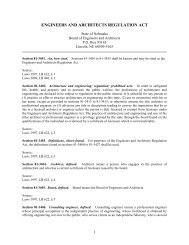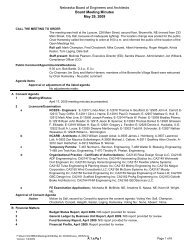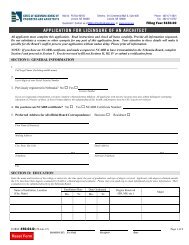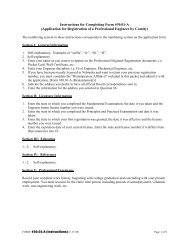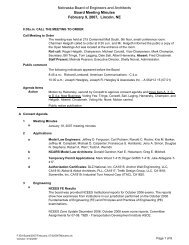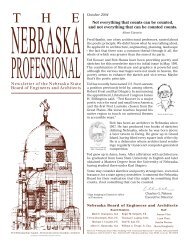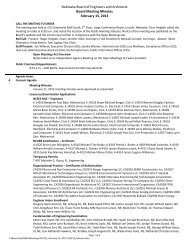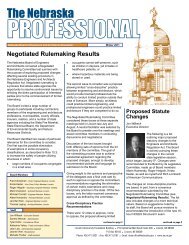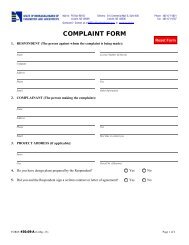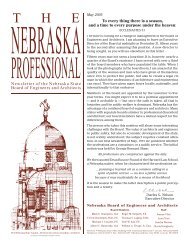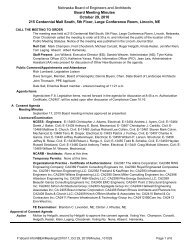Ethics Quiz: Ethics Quiz
Ethics Quiz: Ethics Quiz
Ethics Quiz: Ethics Quiz
Create successful ePaper yourself
Turn your PDF publications into a flip-book with our unique Google optimized e-Paper software.
<strong>Ethics</strong> <strong>Quiz</strong>: <strong>Ethics</strong> <strong>Quiz</strong>: How<br />
Ethical Are You<br />
A Brief Exercise on <strong>Ethics</strong> in the<br />
Workplace
<strong>Ethics</strong> <strong>Quiz</strong>: <strong>Ethics</strong> <strong>Quiz</strong>: How<br />
Ehi Ethical lAre You<br />
• With scandals like the Enron and WorldCom<br />
cases in recent years, it's become all the more<br />
important to understand the rights, the wrongs,<br />
and the gray areas of the business world.<br />
• Mark the correct answer down on a scrap of<br />
paper as we will review afterwards.<br />
• Though more than one answer might seem<br />
possible, pick the best answer to the<br />
questions provided.
<strong>Ethics</strong> <strong>Quiz</strong> #1<br />
• You are an engineering office manager<br />
and one upper-level manager has<br />
repeatedly used the company credit card<br />
for personal expenses. How do you handle<br />
the situation
<strong>Ethics</strong> <strong>Quiz</strong> #1<br />
• a) I do nothing. The person is higher than I<br />
am in the company, so it must be OK.<br />
• b) I confront the person and hope that this<br />
won't threaten my job.<br />
• c) I confront the person and reveal what I<br />
know to a higher-level manager or<br />
someone in human resources.
<strong>Ethics</strong> <strong>Quiz</strong> #2<br />
• You are an engineer with authority over<br />
human resources and an employee comes<br />
to you and says, "I want to tell you<br />
something about someone, but you can't<br />
tell anybody. " He then reveals that<br />
someone pushed another employee in the<br />
company kitchen. Do you tell your boss
<strong>Ethics</strong> <strong>Quiz</strong> #2<br />
• a) I promised not to tell, so I don't<br />
t.<br />
• b) I find out if the employee was injured<br />
and decide based on that whether to tell.<br />
•c) Even though it breaks my promise, I tell<br />
) g y p ,<br />
my boss so the incident goes on record.
<strong>Ethics</strong> <strong>Quiz</strong> #3<br />
• You are an engineer in a firm and although<br />
you're not an accountant, company policy<br />
now requires you to sign off on the tax<br />
filings for the department you oversee.<br />
You've never been a "numbers person"<br />
and don't fully understand the documents.<br />
What do you do
<strong>Ethics</strong> <strong>Quiz</strong> #3<br />
• a) I sign it, figuring that if any problems are<br />
found, I can just argue that it's not my fault<br />
because I didn't understand the document.<br />
• b) I ask someone with more knowledge to<br />
walk me through the report before I sign.<br />
• c) I sign it, vowing to take an accounting<br />
course whenever I find the time.
<strong>Ethics</strong> <strong>Quiz</strong> #4<br />
• As a engineering manager responsible for<br />
hiring employees, you know it's illegal to<br />
ask whether a candidate for a position at<br />
your company is planning on starting a<br />
family, but during the course of the<br />
interview i a woman candidate reveals that t<br />
she intends to do that. Can you decide<br />
whether to hire her based on the<br />
knowledge she might leave the company<br />
sooner or take maternity leave
<strong>Ethics</strong> <strong>Quiz</strong> #4<br />
• a) Yes, since she revealed it, it's fair game<br />
in deciding hires.<br />
• b) No, it would be discriminatory to avoid<br />
picking her for that reason.<br />
• c) If another candidate seems just as good<br />
and that's the only difference, it can<br />
become a factor to break the tie.
<strong>Ethics</strong> <strong>Quiz</strong> #5<br />
• You're a candidate for hire at a great<br />
company as a land surveyor, but you plan<br />
to move across the country in a year. Do<br />
you reveal that during the interview
<strong>Ethics</strong> <strong>Quiz</strong> #5<br />
• a) No, they have no right to know I have<br />
relocation plans.<br />
• b) Yes, I would feel obligated to tell.<br />
•c) If the interviewer asks my long-term<br />
) y g<br />
intentions, I'll admit to my plan.
<strong>Ethics</strong> <strong>Quiz</strong> #6<br />
• A coworker who is also a friend tells you<br />
that he has major concerns about a large<br />
project and plans to tell the vice president<br />
for engineering. You just learned the vice<br />
president has been known to fire people<br />
who have been too vocal against this<br />
project. Do you encourage your friend to<br />
be honest anyway
<strong>Ethics</strong> <strong>Quiz</strong> #6<br />
• a) Yes, honesty is always the best policy.<br />
• b) No, I reveal the dangers of the decision<br />
and encourage the friend to protect his<br />
job.<br />
• c) I explain what I know but try to avoid<br />
encouraging my friend one way or<br />
another.
<strong>Ethics</strong> <strong>Quiz</strong> #7<br />
• A friend, an engineer, has just been fired<br />
from your company. You are an up-andcoming<br />
executive and your boss warns<br />
that if you're seen with this person, you<br />
could lose the respect of those who might<br />
promote you. Before leaving, the friend is<br />
upset and asks you to meet him in the<br />
conference room, something coworkers<br />
will likely see. Do you agree to go comfort<br />
your friend
<strong>Ethics</strong> <strong>Quiz</strong> #7<br />
• a) Yes, human friendships matter more<br />
than any promotion.<br />
• b) Yes, but you ask if you can meet at a<br />
different location.<br />
• c) No, and you cut off all ties with the<br />
shunned employee.
<strong>Ethics</strong> <strong>Quiz</strong> #8<br />
• You're are an engineering manager and<br />
have been asked to work with the public<br />
relations department in writing a press<br />
release about a new product that didn't<br />
turn out quite as well as promised in<br />
earlier reports. How much do you reveal to<br />
the public in the press release
<strong>Ethics</strong> <strong>Quiz</strong> #8<br />
• a) I don't hint at it. It's important that the<br />
company's image is not damaged by the flawed<br />
product.<br />
• b) I write a more mildly enthusiastic, but honest,<br />
release than I would if the product were perfect.<br />
• c) I'm completely honest, believing it will earn<br />
the respect of customers to be forthcoming.
<strong>Ethics</strong> <strong>Quiz</strong> #9<br />
• You're a land surveyor in charge of<br />
creating the budget report that goes to the<br />
board of directors of your company. Just<br />
before the next meeting, the president<br />
asks you to leave something negative out<br />
and just add it in next time. Do you agree<br />
to do this as a favor to him
<strong>Ethics</strong> <strong>Quiz</strong> #9<br />
• a) Yes, one time will not hurt.<br />
• b) Yes, but only after the president agrees<br />
to give you a bonus.<br />
•c) No, one small thing can turn into many<br />
) , g y<br />
small things, which is a big deal.
<strong>Ethics</strong> <strong>Quiz</strong> #10<br />
• An employee casually reveals to you that<br />
he cheats on his wife. You're the<br />
engineering manager in a different<br />
department. Another manager is writing up<br />
a positive performance evaluation for this<br />
employee. Do you tell your co-manager<br />
what you learned
<strong>Ethics</strong> <strong>Quiz</strong> #10<br />
• a) No, what's personal is personal.<br />
• b) Yes, this behavior could eventually<br />
affect the company.<br />
•c) I hint at it but avoid making any definite<br />
) g y<br />
claim.
<strong>Ethics</strong> <strong>Quiz</strong> #1<br />
•“Personal Use of Credit Card” Case<br />
• The correct answer: C<br />
• I confront the person and reveal what I<br />
know to a higher-level manager or<br />
someone in human resources
<strong>Ethics</strong> <strong>Quiz</strong> #1<br />
• Talking to the person is not enough to<br />
ensure that the behavior won't continue.<br />
"Intervening directly is necessary but not<br />
sufficient," says Bruce Weinstein, Ph.D.,<br />
who writes the column "Ask the <strong>Ethics</strong><br />
Guy" for Knight-Ridder Tribune. Weinstein<br />
says management or human resources<br />
should monitor the person.
<strong>Ethics</strong> <strong>Quiz</strong> #2<br />
•“Promise Not to Tell” Case<br />
• The correct answer: C<br />
• Even though it breaks my promise, I tell<br />
my boss so the incident goes on record.
<strong>Ethics</strong> <strong>Quiz</strong> #2<br />
• Jenn Crenshaw, a professor at the University of<br />
Phoenix campus in Richmond, Virginia, says<br />
that a human resources manager should warn<br />
employees before they divulge a secret that her<br />
position and the law might require her to tell<br />
someone else. "Then they get to decide whether<br />
or not they're going to tell me, " Crenshaw says.<br />
Even if she doesn't get a chance to forewarn the<br />
employee before sensitive information is<br />
revealed, she makes sure anything important,<br />
like physical assault, goes on the record by<br />
telling a higher-up.
<strong>Ethics</strong> <strong>Quiz</strong> #3<br />
•“Tax Filing” Case<br />
• The correct answer: B<br />
• I ask someone with more knowledge to<br />
walk me through the report before I sign.
<strong>Ethics</strong> <strong>Quiz</strong><br />
• A signature can be legally binding whether or not the<br />
person had any understanding of the document signed.<br />
"If I was asked to sign something where I wasn't privy to<br />
all the details, I'd have two or three people p reviewing it<br />
and have them sign off," says Charles Kerns, Ph.D., who<br />
recently authored the book Value-Centered <strong>Ethics</strong>. It<br />
also helps to have alignment with employees, which<br />
means employees subscribe to the manager's belief in<br />
ethical responsibility and quality work, says Kerns, a fulltime<br />
faculty member at Pepperdine University's<br />
Graziadio School of Business and Management.
<strong>Ethics</strong> <strong>Quiz</strong> # 4<br />
•“Maternity Leave” Case<br />
• The correct answer: B<br />
• No, it would be discriminatory to avoid<br />
picking her for that reason
<strong>Ethics</strong> <strong>Quiz</strong> # 4<br />
• Deciding not to hire a candidate because<br />
she (or he) is planning to have a family<br />
violates anti-discrimination laws. "It's<br />
impossible to know if the other candidate<br />
might be planning to leave in six months<br />
as well," suggests Jenn Crenshaw.
<strong>Ethics</strong> <strong>Quiz</strong> # 5<br />
•“Relocating Employee” Case<br />
• The correct answer: A<br />
• No, they have no right to know I have<br />
relocation plans.
<strong>Ethics</strong> <strong>Quiz</strong> # 5<br />
• Although this question depends largely on<br />
personal morals, a potential employee has<br />
no obligation to reveal future plans, which<br />
could potentially change. If asked directly,<br />
someone can instead focus on hopes for<br />
growth and promotion within the company<br />
to avoid lying.
<strong>Ethics</strong> <strong>Quiz</strong> # 6<br />
•“Retaliating Vice President” Case<br />
• The correct answer: C<br />
• I explain what I know but try to avoid<br />
encouraging g my friend one way or<br />
another.
<strong>Ethics</strong> <strong>Quiz</strong> # 6<br />
• Personal ethics are important, but it's also<br />
important not to force those decisions on<br />
others, says Don Schierling, a professor at<br />
Regis University. Giving others<br />
information so they can make the best<br />
choice for themselves is generally the best<br />
option, Schierling explains.
<strong>Ethics</strong> <strong>Quiz</strong> # 7<br />
•“Fired Co-worker Friend” Case<br />
• The correct answer: B<br />
• Yes, but you ask if you can meet at a<br />
different location.
<strong>Ethics</strong> <strong>Quiz</strong> # 7<br />
• Sacrificing your career for a friend is probably<br />
more than he or she would ask of you. And yet,<br />
shutting someone out completely is probably<br />
more extreme than necessary unless their<br />
reason for being fired makes them unacceptable<br />
as a friend. Trying to find a middle ground can<br />
save the friendship and the job. "When an<br />
employee is labeled as a loser, if you want to<br />
move up, you do not associate with that person,"<br />
Schierling admits.
<strong>Ethics</strong> <strong>Quiz</strong> #8<br />
•“Press Release” Case<br />
• The correct answer: B<br />
• I write a more mildly enthusiastic, but<br />
honest, release than I would if the product<br />
were perfect.
<strong>Ethics</strong> <strong>Quiz</strong> # 8<br />
• People in public relations must toe the line<br />
between talking positively about a company and<br />
lying outright. Since it's understood that a press<br />
release is going to put a positive spin on any<br />
topic, it's not expected to be fully frank about the<br />
flaws. On the other hand, a major disaster can<br />
sometimes be mitigated by an honest and<br />
upfront handling of the issue with the press.<br />
"Ultimately, you have to answer to yourself,"<br />
says Schierling.
<strong>Ethics</strong> <strong>Quiz</strong> # 9<br />
•““Presidential Request” Case<br />
• The correct answer: C<br />
• No, one small thing can turn into many<br />
small things, which is a big deal.
<strong>Ethics</strong> <strong>Quiz</strong> # 9<br />
• According to Schierling, starting down this<br />
slippery slope can be a dangerous thing<br />
because it's hard to know when to stop. "Crime<br />
seldom starts on a big issue. If you're willing to<br />
lie once, the odds are the second time's easier<br />
than the first. If you're able to do it twice, then<br />
you're able to do it a third time," he says. Kerns<br />
agrees: "When we talk to white collar criminals<br />
in jail, they say they made these incremental<br />
decisions."
<strong>Ethics</strong> <strong>Quiz</strong> # 10<br />
•“Adulterous Co-worker” Case<br />
• The correct answer: A<br />
• No, what's personal is personal.
<strong>Ethics</strong> <strong>Quiz</strong> # 10<br />
• If an employee's off-the-clock behavior could<br />
affect his or her job performance, it's important<br />
the company know about that, says Weinstein.<br />
However, adultery does not often affect job<br />
performance. "It's quite possible to be an<br />
adulterer and an excellent CEO or middle-level<br />
l l<br />
manager, sad as that is," he says. But he adds<br />
that the best thing to do based on personal<br />
ethics may be to speak with the employee about<br />
the emotional and health dangers to his wife.
<strong>Ethics</strong> <strong>Quiz</strong><br />
• Discussion<br />
• Conclusion



